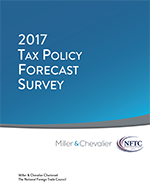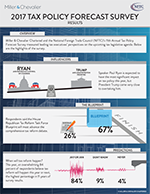Optimism for Comprehensive Tax Reform Hits New High in Survey by Miller & Chevalier and the National Foreign Trade Council
Subtitle
In 11th Annual Forecast, Tax Executives Express Reasons for Hope Amid the Change in Power in Washington
Washington, DC, April 6, 2017 – Miller & Chevalier Chartered and the National Foreign Trade Council (NFTC) today announced the results of their 2017 Tax Policy Forecast Survey, which reveals for the first time in 11 years significant optimism for comprehensive tax reform from leading tax executives at U.S.- and foreign-based companies.


Click Images to View Full Report and Infographic
"The Republican sweep of the 2016 elections combined with continued work on the proposal released by the House Republican Tax Reform Task Force in June of 2016 has our respondents more confident than ever before that comprehensive tax reform will be enacted," said Miller & Chevalier Member and Tax Department Vice Chair Marc Gerson, former majority tax counsel to the House of Representatives Committee on Ways and Means. "Nevertheless, our respondents are still uncertain as to the net impact of a comprehensive tax reform package on their businesses in light of the significant revenue-raising provisions, such as the border adjustment tax, that are being considered."
Respondents believe President Trump will play a larger role in influencing tax policy than they expected President Obama would in previous years. In 2016, President Obama was seen as a distant third behind Speaker of the House Paul Ryan and House Committee on Ways and Means Chairman Kevin Brady. This year, President Trump scored near-equal to Speaker Ryan and higher than Chairman Brady.
Respondents this year also believe it is no longer a question of if tax reform happens, but when. When asked in January what they think the Trump Administration's top priorities will be for 2017, respondents said repealing and replacing the Affordable Care Act would be the top priority. However, in light of the failed House attempt to pass the American Health Care Act in late March, comprehensive tax reform appears to have moved up the agenda.
"Now that the health care debate has been set aside, tax reform is the top legislative priority of both Congress and the Administration," said Cathy Schultz, National Foreign Trade Council Vice President for Tax Policy. "We are hopeful that this renewed focus will result in a comprehensive tax reform package getting over the finish line."
Survey Highlights
- Respondents are concerned with provisions that raise revenue, but they also see the need and potential for tax reform. 42 percent of respondents rank the high statutory tax rate and 33 percent of respondents rank taxation of worldwide income as the top area of business tax concern, both of which would be alleviated by measures outlined in the House Republican Tax Reform Task Force "Blueprint."
- 42 percent of respondents expect 25 percent to be the top corporate tax rate – 5 percentage points higher than proposed in the Blueprint. This suggests some skepticism that Congress will be able to enact a rate as low as 20 percent.
- A third of respondents expect 33 percent to be the top individual tax rate. This is consistent with the Blueprint, which suggests respondents have faith that Congress can reduce the top individual rate to that level.
- Not surprisingly, a third of respondents said Republican control of both chambers of Congress will be the factor that most positively impacts tax policy in 2017. However, 26 percent of tax executives still see the lack of bipartisan support as the greatest impediment to reform. Republicans do not have a filibuster-proof majority in the Senate, and while reconciliation is a possibility, it comes with limitations. Some respondents may think that a bipartisan effort, similar to the successful effort in 1986, will be necessary.
- 22 percent of tax executives say the most important measure they are watching with respect to reform is the border adjustment proposal in the Blueprint, followed closely by an insufficient reduction in the statutory rate (21 percent) and limits on interest deductibility (20 percent).
A full copy of the survey results and analysis are available here. A link to the survey results infographic is available here.
About Miller & Chevalier
Founded in 1920, Miller & Chevalier is a Washington, DC law firm with a global perspective and leading practices in Tax, Employee Benefits (including ERISA), International Law and Business, White Collar and Internal Investigations, Complex Litigation, and Government Affairs. In an era of big law, Miller & Chevalier is a top-ranked firm sharply focused on targeted areas that interact with the federal government. Over the past three years, the firm's lawyers have represented more than 40 percent of the Fortune 100, one-quarter of the Fortune 500 and approximately 30 percent of the Global 100. Based in Washington, DC, a significant number of firm lawyers have held senior positions in the U.S. government and have written many of the regulations they currently help clients navigate. For more information on the firm, visit www.millerchevalier.com.
About the National Foreign Trade Council
The National Foreign Trade Council (www.nftc.org) is a leading business organization advocating an open, rules-based global trading system. Founded in 1914 by a broad-based group of American companies, the NFTC now serves hundreds of member companies through its offices in Washington, DC, and New York.
###
CONTACTS:
Marc Gerson, Vice Chair, Tax Department, Miller & Chevalier, 202.626.1475
Catherine Schultz, Vice President, Tax Policy, National Foreign Trade Council, 202.887.0278, ext. 2023
Aggie Howland, Media Relations, Greentarget, 312.252.4114